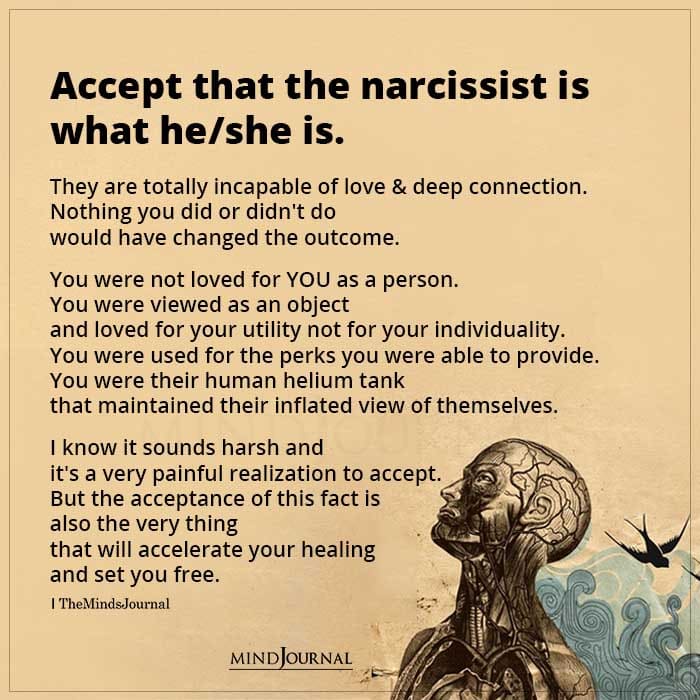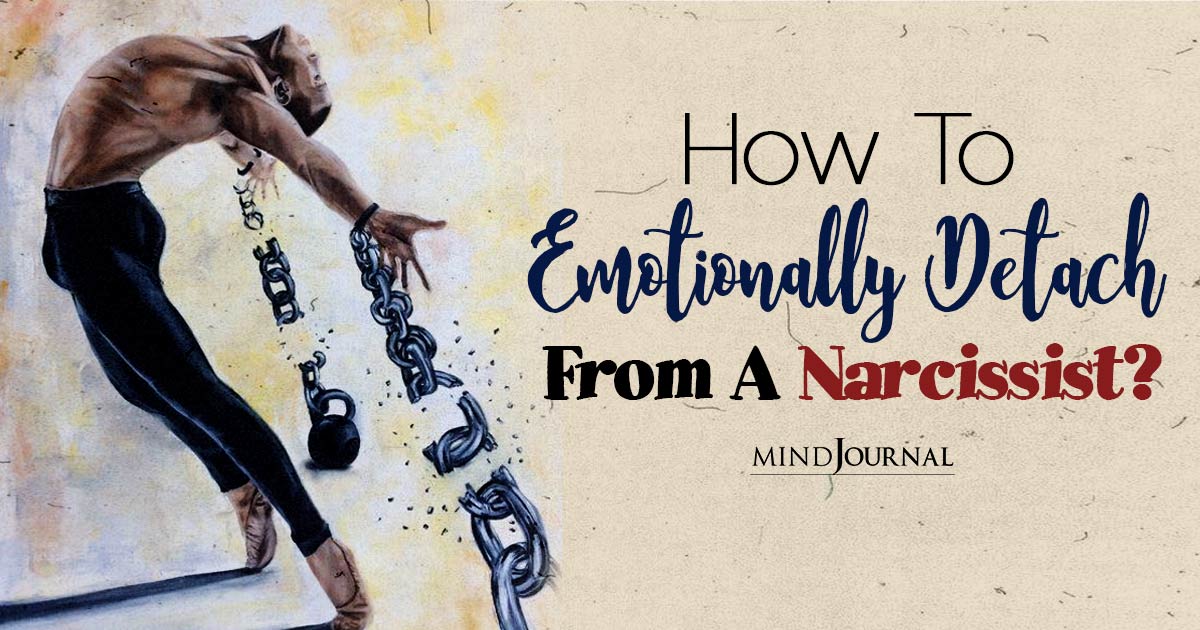Dealing with a narcissist can be quite a handful, and let’s be real, it’s not a walk in the park. Sometimes, you may find yourself needing a bit of space to safeguard your own sanity. So, how to emotionally detach from a narcissist?
Narcissists have this insatiable hunger for attention and admiration, and they’ll stop at nothing to get it, even if it means hurting those around them. Their constant need for validation can drain you emotionally, and that’s when emotional detachment becomes your superhero.
Picture this: you’re the protagonist of your own story, and emotional distance and emotional detachment is your trusty shield, protecting your emotional well-being from the manipulative antics of the narcissist. Sounds empowering, right? Well, let’s dive into some practical ways to create emotional distance from a narcissist.
Related: Breaking Free From The Toxic Web: 9 Steps For Dealing With A Narcissist In Your Life
How To Emotionally Detach From A Narcissist? 8 Steps To Protect Your Emotional Well-Being
1. Cut off contact with the said narcissist.
If you are trying to create emotional distance from a narcissist then limiting contact with them can be a powerful tool in achieving this. If you find yourself struggling to maintain boundaries or feel emotionally drained after interacting with a narcissist, it may be necessary to reduce your contact with them.
This can be especially difficult if you’re in a personal or professional relationship with the narcissist. However, it’s important to prioritize your well-being and recognize that limiting contact is a necessary step in protecting yourself.
You may choose to avoid social events or meetings where the narcissist will be present, or limit communication to necessary interactions only. It’s important to be clear and assertive in communicating your boundaries, and not allow the narcissist to manipulate or guilt-trip you into changing them.
2. Understand that it’s not your fault.
How to detach from a narcissist? Or rather how to emotionally detach from a narcissist? Then understand and recognize that their behavior is not your fault. Narcissists are skilled at manipulating their partners into believing that they are responsible for the problems in the relationship.
It’s important to remember that a narcissist’s behavior is a reflection of their own insecurities and need for control. By accepting that their behavior is not your fault, you can begin to detach from the relationship and take steps to protect yourself.
This may include setting boundaries, limiting contact, and seeking support from friends or a therapist. Remember that you deserve to be treated with respect and kindness, and it’s never your fault if someone chooses to mistreat or manipulate you.

3. Don’t give them the satisfaction of riling you up.
One of the best ways of emotionally detaching from a narcissist is by making sure that you never react to any of the antics and manipulative words.
Narcissists thrive on eliciting emotional reactions from their victims, so staying calm and in control can be a powerful way to take away their power.
This means not reacting emotionally to their tactics, such as gaslighting or guilt-tripping, and instead responding in a factual and assertive manner. By not taking their bait, you’re showing the narcissist that their tactics won’t work on you and that you’re not willing to be manipulated.
Staying calm and in control is not a sign of weakness, but rather a strategy for protecting yourself from their toxic behavior.
Related: 10 Powerful Tactics To Put A Narcissist In Their Place
4. Leave them if you think things are going out of hand.
How to detach from a narcissist, you ask?
When planning to break free from a narcissist, it’s crucial to have a solid exit strategy. This includes getting your finances in order and finding alternative living arrangements if you currently live with the narcissist.
It’s important to make it clear to the narcissist that you’re serious about ending the relationship, and that you’re taking steps to protect yourself.
If you’re not living with the narcissist, it’s still important to have a plan for limiting contact and protecting your boundaries. This may include changing your phone number or blocking them on social media.
It’s important to be assertive in communicating your boundaries and making it clear that you’re no longer willing to tolerate their manipulative behavior.
5. Try to understand the reasons why you are struggling to create emotional distance from a narcissist.
If you are thinking about how to emotionally detach from a narcissist, then this point is particularly important.
Narcissists are skilled at manipulating their victims, making them feel dependent and emotionally attached. Their ability to push emotional buttons can make victims vulnerable to their manipulation.
Additionally, you may struggle with feelings of guilt or abandonment when attempting to distance yourself from the narcissist. It’s important to remember that prioritizing your own well-being is not selfish, but necessary for your emotional health.
Finally, the narcissist may be a part of your daily life, making it challenging to create distance. However, limiting contact and setting clear boundaries can still be effective in protecting yourself from their harmful behavior. By recognizing these obstacles, you can develop strategies to overcome them and create emotional distance from a narcissist.
6. Accept that you will never be able to change a narcissist and neither is it your responsibility.
Emotionally detaching from a narcissist means accepting the harsh reality that narcissists can never be fixed and they will never change, no matter what happens.
It can be challenging to come to terms with the fact that narcissists cannot be fixed or changed. Narcissists lack the ability to empathize or form genuine emotional connections with others, and attempting to change them is often futile.
It’s important to accept this fact and focus on protecting yourself from their harmful behavior. By recognizing that the narcissist will never truly change, you can begin to distance yourself emotionally and prioritize your own well-being.
While it’s natural to want to help or fix those we care about, it’s essential to recognize when it’s not possible and focus on taking care of ourselves instead. You deserve to be treated with respect and kindness, and it’s okay to prioritize your own needs when dealing with a narcissist.
Related: 6 Ways To Prepare When Going No Contact With A Narcissist
7. Spend time with people who love you and support you.
How to emotionally detach from a narcissist?
When emotionally detaching from a narcissist, it’s important to connect with people who support you and remind you of your worth. The narcissist may have convinced you that you’re not deserving of a better relationship, but your friends and loved ones who truly care about you will disagree.
Confiding in a close friend or family member about your reasons for leaving the relationship can provide you with much-needed emotional support and validation. Having someone in your corner can help you feel less alone and more empowered to make positive changes in your life.
You deserve to be surrounded by people who uplift and support you, and seeking out those connections can be a vital part of healing from the toxic effects of a narcissistic relationship.

8. Set strict personal boundaries and never compromise on them.
To create emotional distance from a narcissist requires setting and enforcing firm boundaries. It’s important to establish clear limits on what you’re willing to tolerate and consistently enforce them. Don’t allow the narcissist to control or manipulate you into compromising your boundaries.
Stand up for yourself and assert your needs and preferences. Don’t give in to their demands or guilt-tripping tactics. By having strict personal boundaries, you will be better able to shield yourself from the manipulative tactics of a narcissist, and hence have stronger control over your own life.
Bottomline
Emotionally detaching from a narcissist is like a rollercoaster ride for your emotions. However, with the help of these tips and strategies you’ll become a master of emotional protection.
Related: Breaking Free: The Ultimate Checklist for Ending a Relationship With a Narcissist
Surround yourself with a squad of supportive people, detach with love, and watch yourself bloom through personal growth. And if things get really tough, always remember that you are a strong person who can get through anything in life. Stay strong!
Frequently Asked Questions (FAQs)
How do you hurt a narcissist emotionally?
Engaging in healthy boundaries and refusing to feed their ego can emotionally impact a narcissist. Self-love is another thing that really affects a narcissist emotionally since they fail to manipulate you when you genuinely love yourself.
What is the #1 word a narcissist cannot stand?
The word “no” is one that a narcissist cannot stand, as it challenges their grandiose self-image, and inflated ego, and threatens their need for superiority and admiration.
Can a narcissist feel heartbroken?
While a narcissist may experience a sense of loss or disappointment when their ego is bruised or they are denied narcissistic supply, their response is typically more focused on their wounded pride rather than genuine heartbreak or empathetic sorrow.










Leave a Reply